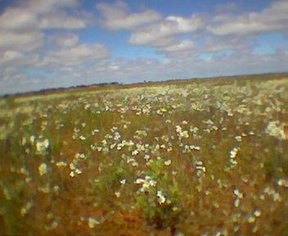 These are the white paper daisies in outback Australia.Seen better days, goes the popular song of the moment, Pete Murray.
These are the white paper daisies in outback Australia.Seen better days, goes the popular song of the moment, Pete Murray.
http://www.azlyrics.com/lyrics/petemurray/betterdays.html
Also more at:
www.petemurray.com
Here's the lyrics; it plays in cafes, cars, where ever you go.
"Better Days"
And I saw it coming
I saw emptiness and tragedy
And I felt like runningSo far away
But knew I had to stay
And I know when I'm older
I look back and I still feel the pain
I know I'll be stronger and I know I'll be fine
For the rest of my daysI've seen better days
Put my face in my handsGet down on my knees and I pray to God
Hope he sees me through till the end
I noticed the smallest things
But I didn't notice the change
It was hot in the morning
Then it turned so cold, twas the end of the day
There was no condensation I just felt like I was in space
I needed my friends there I just turned around
They were gone without a traceI've seen better days
Put my face in my handsGet down on my knees and I pray to God
Hope he sees me through till the end
Now I have just started
And I won't be done till the end
There's nothing I have lost
That was once placed upon the palm of my hands
And all of these hard timesHave faded round the bend
Now that I'm wiser I cannot wait
Till I can help my friendsI've seen better days
Put my face in my hands
Get down on my knees and I pray to God
Hope he sees me through till the end
Seen better days
Put my face in my hands
Get down on my knees and I pray to God
Hope he sees me through till the end
Seen betterNa Na Na Na Na Na Na [x4]

 This is a procession through the streets of Sydney one Sunday. Tens of thousands of people turned out. The procession from the oldest Catholic church in Sydney, carrying relics left by the first priest after he was forced to leave the colony, we weren't the master of the detail, or of our destiny. It was a very colourful event; yellow balloons, St Mary, everyone expected a miracle. They thronged around St Mary's. I was carried away too, now, in the longing for a deeper space. That wasn't so much what propelled him, as fostered him. If there was anything there. The audience was in raptures and he was not one to argue. There had been a poverty of experience and it needed to be overcome. All the dignity and coverage we give to far narrower interest groups; who would be in raptures to get a turnout like this. Even the Work Choices march, the other great march of the period. They scattered in the streets now, quickly, as if there wasn't any heart but in the pubs, which did a roaring trade. The Catholics of course took their families, all ages, all nationalities, all determined in their beliefs, the nuns in grey, chanting, waving incense, the intense look in some boys faces; for which the future path might be very different to his. If only it hadn't gone so quickly. We shared there, in long stakeouts and rushed jobs and seas of suits, confidences we would never share with anyone else; not in the same way. But not all his human interaction could be photographers. He hid low, sometimes, behind the terminal, dawdled with a feature. There were more dead in Iraq. There always was. How much more could the moral stain spread from this. We met each other through text and sat for a moment watching the view, the crowds flowing into the cathedral, the thousands gathering outside. It was a finished moment, legs swinging briefly in the Sydney winter sun, the sandstone courtyard, enough people talked to, enough people canvassed. He was getting better, he thought. Two steps forward and one step back. Their raptures, his sanity. They went hunting for a taxi in the crowded silence. There wasn't any way out.
This is a procession through the streets of Sydney one Sunday. Tens of thousands of people turned out. The procession from the oldest Catholic church in Sydney, carrying relics left by the first priest after he was forced to leave the colony, we weren't the master of the detail, or of our destiny. It was a very colourful event; yellow balloons, St Mary, everyone expected a miracle. They thronged around St Mary's. I was carried away too, now, in the longing for a deeper space. That wasn't so much what propelled him, as fostered him. If there was anything there. The audience was in raptures and he was not one to argue. There had been a poverty of experience and it needed to be overcome. All the dignity and coverage we give to far narrower interest groups; who would be in raptures to get a turnout like this. Even the Work Choices march, the other great march of the period. They scattered in the streets now, quickly, as if there wasn't any heart but in the pubs, which did a roaring trade. The Catholics of course took their families, all ages, all nationalities, all determined in their beliefs, the nuns in grey, chanting, waving incense, the intense look in some boys faces; for which the future path might be very different to his. If only it hadn't gone so quickly. We shared there, in long stakeouts and rushed jobs and seas of suits, confidences we would never share with anyone else; not in the same way. But not all his human interaction could be photographers. He hid low, sometimes, behind the terminal, dawdled with a feature. There were more dead in Iraq. There always was. How much more could the moral stain spread from this. We met each other through text and sat for a moment watching the view, the crowds flowing into the cathedral, the thousands gathering outside. It was a finished moment, legs swinging briefly in the Sydney winter sun, the sandstone courtyard, enough people talked to, enough people canvassed. He was getting better, he thought. Two steps forward and one step back. Their raptures, his sanity. They went hunting for a taxi in the crowded silence. There wasn't any way out. 
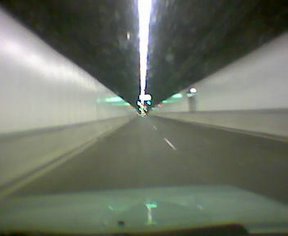 This is the cross-city tunnel on the first day that it was free. I had to go through. I had become obsessed with the cross-city tunnel as symbolic of everything that was wrong with the city. I took Joyce and the kids, so we could all say we had been through it. Normally it would cost three dollars fifty six on a compulsory e-tag one way; and fed into other networks which also cost money. They were narrowing William Street to compel people into the tunnel. It was unconscionable. It was all in the contract. Personnel went from public to private. Public-private partnerships began to stink. I was just somehow so disappointed in the whole damn lot of them. It was like being taken over by the mafia. These people didn't have a clue. How could you treat the city's people like that? I had this fantasy that one day there would be one more impost too far and the entire city en masse would just throw up the candle and say it's not worth it anymore. And just stay home, barricading in the front door, getting in supplies. There just came a point when the figures just didn't add up. He felt like everything, everything had gone to mud right in the pit of his stomach. Panic. And he paid another taxi driver and went to another function; and he was treated fine in treacherous dens. We moved quietly. And there was never another way out.
This is the cross-city tunnel on the first day that it was free. I had to go through. I had become obsessed with the cross-city tunnel as symbolic of everything that was wrong with the city. I took Joyce and the kids, so we could all say we had been through it. Normally it would cost three dollars fifty six on a compulsory e-tag one way; and fed into other networks which also cost money. They were narrowing William Street to compel people into the tunnel. It was unconscionable. It was all in the contract. Personnel went from public to private. Public-private partnerships began to stink. I was just somehow so disappointed in the whole damn lot of them. It was like being taken over by the mafia. These people didn't have a clue. How could you treat the city's people like that? I had this fantasy that one day there would be one more impost too far and the entire city en masse would just throw up the candle and say it's not worth it anymore. And just stay home, barricading in the front door, getting in supplies. There just came a point when the figures just didn't add up. He felt like everything, everything had gone to mud right in the pit of his stomach. Panic. And he paid another taxi driver and went to another function; and he was treated fine in treacherous dens. We moved quietly. And there was never another way out. 
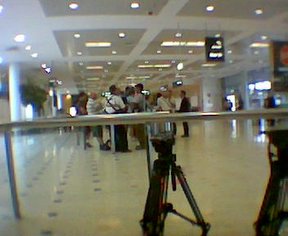
 We spent a lot of time at the airport, days it seemed, waiting for the model Michelle Leslie, who had just got out of jail after spending three months for possessing two ecstasy pills. The Bali tourist market must be dead by now. If they're not blowing them up they're busting them. You think Bali was so popular all these years because of the quality of the sea food, or because it was party town? And when the party was over for all of us, and you still had to show up for work. That was what was confusing. That there didn't seem any way out anymore. That in all the nestling and bustling something entirely abstract was lost. We had dealt into all of it, dwelt in all of it, and these passionless slides of colour was all there was to show? That was it, that was what hurt the most in the end, that everything he had ever believed in had turned to dust. In the end there was no salvation for what he sought. There was no redemption. The body grew less and less fit to deal with it. He allowed a grime to coat what had once been a sparkiling spirit. He couldn't keep the swamp at bay, all those viruses, all that danger. He was caught in it and he wasn't sure there was any way out. There just wasn't enough money to make a full escape. She wasn't on the flight all Sunday. She was on the flight first thing Tuesday. The controversy had raged all the while; a beautiful young model, a millionaire boyfriend, drugs, who could want for more. It was one of the worst crushes I had seen in years, print, radio, television, absolutely no one cooperating. It was great theatre. There was nothing to embroider. The graat weight was gone. Again. Amid the hours we had waited and the flights we had ticked off, there wasn't anything else to play but a straight bat and downbeat humour.
We spent a lot of time at the airport, days it seemed, waiting for the model Michelle Leslie, who had just got out of jail after spending three months for possessing two ecstasy pills. The Bali tourist market must be dead by now. If they're not blowing them up they're busting them. You think Bali was so popular all these years because of the quality of the sea food, or because it was party town? And when the party was over for all of us, and you still had to show up for work. That was what was confusing. That there didn't seem any way out anymore. That in all the nestling and bustling something entirely abstract was lost. We had dealt into all of it, dwelt in all of it, and these passionless slides of colour was all there was to show? That was it, that was what hurt the most in the end, that everything he had ever believed in had turned to dust. In the end there was no salvation for what he sought. There was no redemption. The body grew less and less fit to deal with it. He allowed a grime to coat what had once been a sparkiling spirit. He couldn't keep the swamp at bay, all those viruses, all that danger. He was caught in it and he wasn't sure there was any way out. There just wasn't enough money to make a full escape. She wasn't on the flight all Sunday. She was on the flight first thing Tuesday. The controversy had raged all the while; a beautiful young model, a millionaire boyfriend, drugs, who could want for more. It was one of the worst crushes I had seen in years, print, radio, television, absolutely no one cooperating. It was great theatre. There was nothing to embroider. The graat weight was gone. Again. Amid the hours we had waited and the flights we had ticked off, there wasn't anything else to play but a straight bat and downbeat humour.
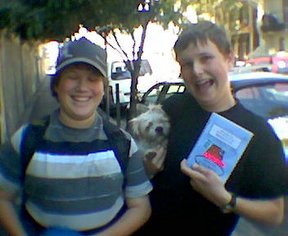 This is my son Sam and his friend Todd. They're 14 and pretty funny kids, the house full of the laughter and twisted humour of tweenagers; another life impossible to imagine. What do you do? they ask; and in the alchemy of it all, scanning texts and flipping across points of information; when the kids are old enough to get themselves to school and the peace that had distinguished all the chaotic times. Sammy won a prize to go to Nova 96.9's Christmas Party and to invite three mates. Nova for the uninitiated is the coolest radio station on the planet as far as the youth vote is concerned. They rang up and asked and said he was one in five; and then announced him the victor as if there wasn't anyone else on line; not really. I spent the day in court watching extradition proceedings for a very bad boy. Well for an entrepenarial spirit who took the opportunities created buy the legal status of various things. You're a very good dog and I love you very much, he said to their pet Major, as if these flashes of domesticity were more deeply important than anything else. He crawled into his nest the bed and was never happier; as if these moments were the most important, the warmest, he would ever experience. Another made a dash for the door and he knew in their heart was curdled contempt. The landscape, the giant eucalyptus trees, Yellow Box and Red Gum across the flat, rich plains; these things were part of him even here in the smog soaked streets. We couldn't have stayed on the barstool alone. The fantasies would have been harsher, crueler, more arid and more abstract by the year. I didn't have any contingency plans for after 30, did you? he asked. No, Colin laughed; and in all the puddles of the past we weathered, it was children that provided the most surprising turn around; that redirected anguished rhetoric and warmed his contact with humanity's flow. It would never have been a sunny day. The car, smashed, crumpled in half, out there in the outback where their whole life could have disintegrated in a moment; where instead he was found 200 yards away, crying, a slight cut to his head, but otherwise fine. Where is he, where is he? we asked, upside down, unable to get out the doors. We had to crawl out through the boot; thinking all the while he was underneath the car. He's alright, he's alright, his mother yelled back; and I couldn't believe our luck, with the lurching sinking dread of what could have happened still leaving him shocked; completely apart. But an angel, so it seemed, had reached down in that exact instant, and said: it's not your time yet. And we lived to see our son grow. And we lived to hear the laughter in the house. The great dance that music had become. And to see and tolerate their intense excitement, for Sam and Todd and his mates Kenny and Arial, as they headed to the coolest party of the year. You can be grateful, not just for the small things but the big. For life, and the life of others. For the future, which could have been so easily lost.
This is my son Sam and his friend Todd. They're 14 and pretty funny kids, the house full of the laughter and twisted humour of tweenagers; another life impossible to imagine. What do you do? they ask; and in the alchemy of it all, scanning texts and flipping across points of information; when the kids are old enough to get themselves to school and the peace that had distinguished all the chaotic times. Sammy won a prize to go to Nova 96.9's Christmas Party and to invite three mates. Nova for the uninitiated is the coolest radio station on the planet as far as the youth vote is concerned. They rang up and asked and said he was one in five; and then announced him the victor as if there wasn't anyone else on line; not really. I spent the day in court watching extradition proceedings for a very bad boy. Well for an entrepenarial spirit who took the opportunities created buy the legal status of various things. You're a very good dog and I love you very much, he said to their pet Major, as if these flashes of domesticity were more deeply important than anything else. He crawled into his nest the bed and was never happier; as if these moments were the most important, the warmest, he would ever experience. Another made a dash for the door and he knew in their heart was curdled contempt. The landscape, the giant eucalyptus trees, Yellow Box and Red Gum across the flat, rich plains; these things were part of him even here in the smog soaked streets. We couldn't have stayed on the barstool alone. The fantasies would have been harsher, crueler, more arid and more abstract by the year. I didn't have any contingency plans for after 30, did you? he asked. No, Colin laughed; and in all the puddles of the past we weathered, it was children that provided the most surprising turn around; that redirected anguished rhetoric and warmed his contact with humanity's flow. It would never have been a sunny day. The car, smashed, crumpled in half, out there in the outback where their whole life could have disintegrated in a moment; where instead he was found 200 yards away, crying, a slight cut to his head, but otherwise fine. Where is he, where is he? we asked, upside down, unable to get out the doors. We had to crawl out through the boot; thinking all the while he was underneath the car. He's alright, he's alright, his mother yelled back; and I couldn't believe our luck, with the lurching sinking dread of what could have happened still leaving him shocked; completely apart. But an angel, so it seemed, had reached down in that exact instant, and said: it's not your time yet. And we lived to see our son grow. And we lived to hear the laughter in the house. The great dance that music had become. And to see and tolerate their intense excitement, for Sam and Todd and his mates Kenny and Arial, as they headed to the coolest party of the year. You can be grateful, not just for the small things but the big. For life, and the life of others. For the future, which could have been so easily lost. 
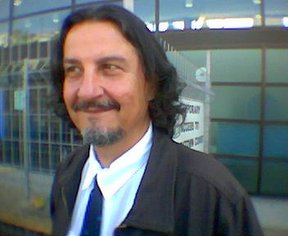 This is Les Kennedy, the police reporter for the Sydney Morning Herald. This is him outside the Blacktown Court, I think it was, where the court was a series of runways under construction. We were there, the usual suspects, for the appearance of a mother who's daughter had died from a methadone overdose. It was the usual classic; it was nobody's fault, the house, "a supermarket of drugs" the police prosecutor described it, had more than a litre of methadone, a safe for the drugs to be locked up in, theoretically away from the children, and there was the classic clash between the police prosecutor and the presumably left wing magistrate, who appeared to be oozing concern for the distraught and emotional mother, who's six year old daughter Rose had died of a methadone overdose after she had given it to her thinking, allegedly, that it was cough medicine. Even here, even now, the scams continued apace. Nothing was anybody's fault. The supermarket of drugs was just another house. The grieving parents were not murderers. Two more kids ended up in hospital on methadone overdoses and it was nobody's fault. Or the doctor's fault. Or methadone's fault. She sobbed, she cried, she twisted. We were immune to blandishments. We just wanted the story and to get going. The police appeared to have absolutely no sympathy. The stepfather was silent, depressed, refused bail, said nothing. The mother was voluble, tearful, trying frantically to get out, and was refused bail. A handsome officer in shorts laughed right next to her, what do you expect if you've got a house full of dope and you're doped yourself; and these were a sub-species in the sprawling suburbs, irredeemable, dependent on welfare, drunk, stoned and unable to look after themselves. We saw them every day. And in the end it was hard to know if we cared either. We filed, we wondered where the world was going, we watched our own grime turn inwards and looked upward and away. There was little that could be said, in the end, did we even know each other's names; the gang that was everywhere in a city which had essentially collapsed into warring factions, ghettos, classes, suburbs where no one crossed the line. The stratification of wealth. I saw it all like froth at the edge of the beach; looking down, and somehow, my heart was gone, compassion disintegrated; scattered with an aridity that just didn't care anymore. We were professional empaths and the empathy had gone. We needed to keep our own hearth secure; our own futures tied up; and all around everything we had ever believed in was gone. Single tragedies and multiple tragedies, like malt whisky, came and went by the day. Our time was brief. Our dignity gone. I pleaded for a better life and forgot how good things were in the cesspit we still called home. This city used to be a great place to live, 30 years ago, I said to a taxi driver, the universal taxi driver, and he nodded. It was always easy to agree. The good days were gone. Sydney was a big city now. And with it came the grime.
This is Les Kennedy, the police reporter for the Sydney Morning Herald. This is him outside the Blacktown Court, I think it was, where the court was a series of runways under construction. We were there, the usual suspects, for the appearance of a mother who's daughter had died from a methadone overdose. It was the usual classic; it was nobody's fault, the house, "a supermarket of drugs" the police prosecutor described it, had more than a litre of methadone, a safe for the drugs to be locked up in, theoretically away from the children, and there was the classic clash between the police prosecutor and the presumably left wing magistrate, who appeared to be oozing concern for the distraught and emotional mother, who's six year old daughter Rose had died of a methadone overdose after she had given it to her thinking, allegedly, that it was cough medicine. Even here, even now, the scams continued apace. Nothing was anybody's fault. The supermarket of drugs was just another house. The grieving parents were not murderers. Two more kids ended up in hospital on methadone overdoses and it was nobody's fault. Or the doctor's fault. Or methadone's fault. She sobbed, she cried, she twisted. We were immune to blandishments. We just wanted the story and to get going. The police appeared to have absolutely no sympathy. The stepfather was silent, depressed, refused bail, said nothing. The mother was voluble, tearful, trying frantically to get out, and was refused bail. A handsome officer in shorts laughed right next to her, what do you expect if you've got a house full of dope and you're doped yourself; and these were a sub-species in the sprawling suburbs, irredeemable, dependent on welfare, drunk, stoned and unable to look after themselves. We saw them every day. And in the end it was hard to know if we cared either. We filed, we wondered where the world was going, we watched our own grime turn inwards and looked upward and away. There was little that could be said, in the end, did we even know each other's names; the gang that was everywhere in a city which had essentially collapsed into warring factions, ghettos, classes, suburbs where no one crossed the line. The stratification of wealth. I saw it all like froth at the edge of the beach; looking down, and somehow, my heart was gone, compassion disintegrated; scattered with an aridity that just didn't care anymore. We were professional empaths and the empathy had gone. We needed to keep our own hearth secure; our own futures tied up; and all around everything we had ever believed in was gone. Single tragedies and multiple tragedies, like malt whisky, came and went by the day. Our time was brief. Our dignity gone. I pleaded for a better life and forgot how good things were in the cesspit we still called home. This city used to be a great place to live, 30 years ago, I said to a taxi driver, the universal taxi driver, and he nodded. It was always easy to agree. The good days were gone. Sydney was a big city now. And with it came the grime. 
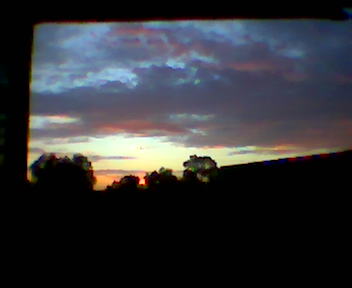 Secrets; these things that I never tell anybody, thoughts that should be free and easy but never are. Such an easy going guy, they say, and all the time the brain is itching and scrastching in troubled places, dying for a drink, waking up under the table at a party, syringe in arm; someone holding me down and pouring whisky down my throat, sticking a joint in my mouth. None, in these strange places in the outback were no one will ever know, where the thoughts run wild and really, really, no one will ever know. Unless you tell them. That was always the policy. Plausible deniability. Not that it matters anymore; the creaking framework on the bones, the creaking pretences; they're strung like x-rays in the falling light; when they smoked and drank champagne and wondered where; and why; we had become so different. I've reads a couple of gay books lately and I've put them down; saddened and horrified and wondering where it all went wrong. I read The Beauty of Men by the author of Dancer from the Dance; which was a big book back in the 70s when we were all up till dawn and bi-sexuality in the days of Bowie was almost compulsory. Everyone was pushing the boundaries, or what we thought were the boundaries. Pretty tame now, tell you what. Now, with the reading light and the back garden and the sound of our colleagues down The Block, late at night screaming abuse at God knows what; I'm reading My Lives by Edmund White. He wrote a book I liked years back and I interviewed him in London in the 1980s for some magazine or other. All the reviewers at the time commented on his soulful, large brown eyes and the impact they had; and I felt, in whatever room it was I interviewed him in; that we connected somehow. He was living in Paris then, his Paris phase, and I was just a freelance journalist from the provinces patching together a living. I thought, the way he acted, he was going to ask me out afterwards; there would be some altercation; another event with another famous man; who, in the end, were no different to any other man. Maybe even more insecure. But he hesitated and I hesistated and all these years later I'm reading his biography; about him in his sixties and his sado-masochistic slave practices, pushing the boundaries, every boundary, boundaries I never ever wanted to cross. The truth is I always liked something else far more than sex; male or female; and if it wasn't so personally, so life and career and reputation destroying, I'd probably still be at it. Instead, restless, irritable, discontent, the default position of the untreated alcoholic, we keep secrets we should never have kept, look out on sunsets we should never have seen, jerk around instead of entering the slipstream of the spirit, and wonder, still, naively, what it was all about. The Dancer from the Dance became the old man on the beat, horrified by his own unattractiveness, sucking knobs through glory holes and worryiong about his weight, wondering whether to dye his hair. While Edmund, HIV, provides TMF, too much information, about sex practices I don't even want to think about in the most removed of fashions. Instead, there's cigarettes and sunsets and a longing for beauty. And we get up and go to work. And others just retreated, not just from the dance but the gay world altogether, rewriting the script inside the head like a million other married men, and tonight I don a white shirt and tie and go to my daughter's Awards night. And we know that one path obviates another; and there was never any true path, or true loyalty, anyway.
Secrets; these things that I never tell anybody, thoughts that should be free and easy but never are. Such an easy going guy, they say, and all the time the brain is itching and scrastching in troubled places, dying for a drink, waking up under the table at a party, syringe in arm; someone holding me down and pouring whisky down my throat, sticking a joint in my mouth. None, in these strange places in the outback were no one will ever know, where the thoughts run wild and really, really, no one will ever know. Unless you tell them. That was always the policy. Plausible deniability. Not that it matters anymore; the creaking framework on the bones, the creaking pretences; they're strung like x-rays in the falling light; when they smoked and drank champagne and wondered where; and why; we had become so different. I've reads a couple of gay books lately and I've put them down; saddened and horrified and wondering where it all went wrong. I read The Beauty of Men by the author of Dancer from the Dance; which was a big book back in the 70s when we were all up till dawn and bi-sexuality in the days of Bowie was almost compulsory. Everyone was pushing the boundaries, or what we thought were the boundaries. Pretty tame now, tell you what. Now, with the reading light and the back garden and the sound of our colleagues down The Block, late at night screaming abuse at God knows what; I'm reading My Lives by Edmund White. He wrote a book I liked years back and I interviewed him in London in the 1980s for some magazine or other. All the reviewers at the time commented on his soulful, large brown eyes and the impact they had; and I felt, in whatever room it was I interviewed him in; that we connected somehow. He was living in Paris then, his Paris phase, and I was just a freelance journalist from the provinces patching together a living. I thought, the way he acted, he was going to ask me out afterwards; there would be some altercation; another event with another famous man; who, in the end, were no different to any other man. Maybe even more insecure. But he hesitated and I hesistated and all these years later I'm reading his biography; about him in his sixties and his sado-masochistic slave practices, pushing the boundaries, every boundary, boundaries I never ever wanted to cross. The truth is I always liked something else far more than sex; male or female; and if it wasn't so personally, so life and career and reputation destroying, I'd probably still be at it. Instead, restless, irritable, discontent, the default position of the untreated alcoholic, we keep secrets we should never have kept, look out on sunsets we should never have seen, jerk around instead of entering the slipstream of the spirit, and wonder, still, naively, what it was all about. The Dancer from the Dance became the old man on the beat, horrified by his own unattractiveness, sucking knobs through glory holes and worryiong about his weight, wondering whether to dye his hair. While Edmund, HIV, provides TMF, too much information, about sex practices I don't even want to think about in the most removed of fashions. Instead, there's cigarettes and sunsets and a longing for beauty. And we get up and go to work. And others just retreated, not just from the dance but the gay world altogether, rewriting the script inside the head like a million other married men, and tonight I don a white shirt and tie and go to my daughter's Awards night. And we know that one path obviates another; and there was never any true path, or true loyalty, anyway. 








